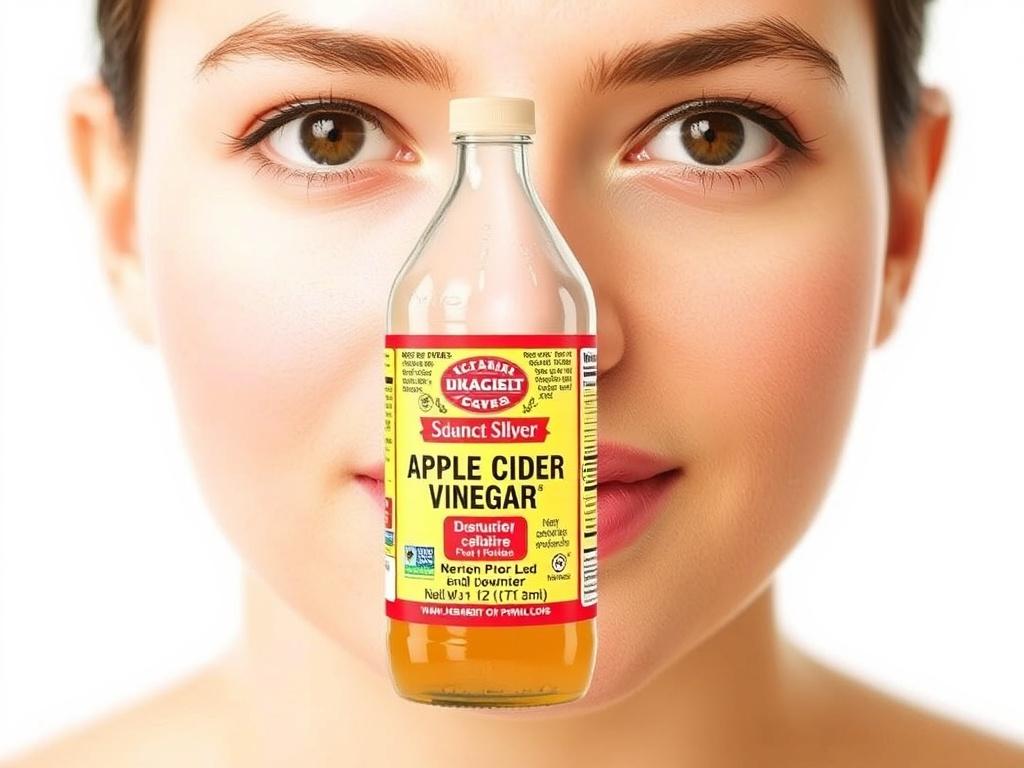Содержание статьи
- 1 What is Apple Cider Vinegar?
- 2 How Does Apple Cider Vinegar Interact With Skin?
- 3 Apple Cider Vinegar for Acne: Myth vs. Reality
- 4 Other Skin Concerns Apple Cider Vinegar Might Help
- 5 How to Safely Use Apple Cider Vinegar on Your Skin
- 6 Who Should Avoid Using Apple Cider Vinegar on Skin?
- 7 Comparing Apple Cider Vinegar to Other Popular Skincare Acids
- 8 DIY Apple Cider Vinegar Skin Care Recipes
- 9 What Does Science Say? Current Research on ACV and Skin
- 10 Final Thoughts: Is Apple Cider Vinegar Right for Your Skin?
- 11 Conclusion
Apple cider vinegar (ACV) has been gaining popularity as a natural remedy for a variety of health and beauty concerns, especially when it comes to skincare. From celebrities raving about its benefits to countless beauty blogs recommending it as a must-have in your daily routine, ACV is often touted as a miracle ingredient for improving skin health. But can apple cider vinegar truly improve your skin, or is it just another overhyped trend? In this article, we’ll dive deep into the science, benefits, risks, and practical uses of apple cider vinegar for skin care. Whether you’re battling acne, sensitive skin, or trying to achieve a radiant glow, you’ll find useful insights and tips to decide if this natural product deserves a place in your skincare arsenal.
What is Apple Cider Vinegar?
Apple cider vinegar is made by fermenting crushed apples. Through this fermentation process, the sugars in apples turn into alcohol and subsequently into acetic acid, the primary active component of vinegar. This acetic acid gives ACV its characteristic tangy smell and strong taste. Besides acetic acid, apple cider vinegar contains other acids, vitamins, minerals, and enzymes, which some claim provide various health and skincare benefits.
Unlike distilled white vinegar, ACV is often sold unfiltered and raw, containing strands of proteins, enzymes, and beneficial bacteria known as “the mother.” Many enthusiasts believe that these components enhance the health properties of apple cider vinegar, making it not just a condiment but also a natural healing and skincare agent.
How Does Apple Cider Vinegar Interact With Skin?
To understand if apple cider vinegar can improve your skin, it’s important to know how skin works and how substances like ACV interact with it. The outermost layer of your skin, the epidermis, serves as a protective barrier. It has a slightly acidic pH level—usually around 4.5 to 5.5—which protects against harmful bacteria, pollution, and other environmental factors.
Apple cider vinegar itself is acidic, with a pH level ranging roughly between 2 and 3. When diluted properly, it can help restore and balance the skin’s natural pH level. Since pH balance is vital for healthy skin, maintaining it can improve skin texture, reduce inflammation, and fight off unwelcome bacteria.
Here’s what makes ACV an interesting skincare ingredient:
- It is naturally antibacterial, which helps fight acne-causing bacteria.
- Its acidity can exfoliate dead skin cells, leading to smoother skin.
- Contains antioxidants that may reduce signs of aging and skin damage.
- Helps balance pH to maintain a healthy skin barrier.
Apple Cider Vinegar for Acne: Myth vs. Reality

Acne is one of the most common skin issues many seek to treat with home remedies like ACV. Acne develops when hair follicles become clogged by oil, dead skin cells, and bacteria. Conventional treatments often use antibacterial ingredients and exfoliants to clear pores and reduce inflammation.
Because of its antibacterial and acidic properties, many believe apple cider vinegar can be an effective natural acne treatment. Research supports that ACV’s acetic acid may kill certain acne-causing bacteria. Additionally, the mild exfoliation effect from its acids might help clear dead skin buildup that clogs pores.
However, there are important things to consider:
| Potential Benefits of ACV for Acne | Potential Risks of Using ACV on Acne-Prone Skin |
|---|---|
| Antibacterial effect reduces bacteria causing pimples | Undiluted ACV is highly acidic and can burn or irritate the skin |
| Aids gentle exfoliation to prevent clogged pores | Some people’s skin may become overly dry or flaky after use |
| May reduce inflammation and redness from pimples | Risk of allergic reactions or increased sensitivity, especially with sun exposure |
For best results, ACV should always be diluted — usually one part vinegar to three or four parts water — and applied only once a day or less. Patch testing is crucial before using ACV widely on the face.
Other Skin Concerns Apple Cider Vinegar Might Help
Beyond acne, apple cider vinegar users claim it can improve several other skin concerns. Let’s explore some of the most common uses and what evidence suggests.
1. Skin Tone and Brightening
Some people use diluted ACV as a toner to brighten their complexion and even out skin tone. The mild alpha hydroxy acids (AHAs) in ACV help remove dead skin cells, enhancing radiance.
2. Reducing Age Spots and Hyperpigmentation
Because ACV contains acetic and lactic acids, which are types of AHAs, it may have mild skin-lightening effects over time. These acids encourage cell turnover, which can help to fade dark spots caused by sun exposure or aging.
3. Soothing Sunburn and Itchy Skin
There is anecdotal evidence that ACV baths or diluted ACV sprays can soothe sunburn or relieve minor skin irritations, thanks to its anti-inflammatory and antibacterial qualities.
4. Treating Dandruff and Scalp Issues
While this isn’t exactly skin on the face, many people use apple cider vinegar to treat flaky scalp and dandruff. The vinegar’s acidity balances scalp pH and removes buildup, promoting healthier scalp skin.
How to Safely Use Apple Cider Vinegar on Your Skin
If you’re interested in trying apple cider vinegar as part of your skincare routine, safety is paramount. Since ACV is acidic, improper use can cause skin irritation, burns, or worsening conditions. Here’s a step-by-step guide:
- Always dilute: Mix one part ACV with at least three to four parts water. Sensitive skin may require more dilution.
- Perform a patch test: Apply the diluted mixture on a small patch of skin (wrist or behind the ear) and wait 24 hours to check for adverse reactions.
- Use as a toner or spot treatment: Apply with a cotton ball to clean skin, or dab directly on acne spots gently.
- Limit frequency: Start with once every other day to monitor how your skin reacts.
- Moisturize: Follow with a gentle moisturizer to prevent dryness.
- Avoid during sun exposure: ACV can make skin more sensitive to sunlight, increasing the risk of burns or pigmentation.
Who Should Avoid Using Apple Cider Vinegar on Skin?
While many people benefit from natural remedies, apple cider vinegar is not suitable for everyone. It’s best avoided by:
- Those with very sensitive skin or eczema, as ACV may worsen irritation.
- People with open wounds or severe acne lesions, to prevent stinging or infection.
- Anyone allergic to apples or vinegar.
- Individuals using strong skincare products like retinoids or chemical peels, since layering acidic treatments can damage the skin barrier.
Always consult your dermatologist if you’re unsure about introducing ACV into your routine.
Comparing Apple Cider Vinegar to Other Popular Skincare Acids
The skincare world today is full of acids: glycolic acid, salicylic acid, lactic acid, and more. How does apple cider vinegar compare to these established ingredients? Here’s a quick overview:
| Acid Type | Common Use | Strength | Notes |
|---|---|---|---|
| Acetic Acid (Apple Cider Vinegar) | Antibacterial, mild exfoliation, pH balancing | Mild to moderate (depends on dilution) | Natural source, may cause irritation; less studied in clinical trials |
| Glycolic Acid (AHA) | Exfoliation, anti-aging, brightening | Moderate to strong | Clinically proven; derived from sugarcane; sometimes irritating |
| Salicylic Acid (BHA) | Acne treatment, pore clearing | Moderate | Oil-soluble, penetrates pores; good for oily skin |
| Lactic Acid (AHA) | Gentle exfoliation, hydration | Gentle to moderate | Hydrating properties; good for sensitive skin |
While apple cider vinegar contains acetic acid and small amounts of other AHAs like lactic acid, its concentration and consistency vary depending on the brand and production method. This makes it less predictable than purified skincare acids, but it remains an appealing option for those seeking natural alternatives.
DIY Apple Cider Vinegar Skin Care Recipes
If you want to experiment with apple cider vinegar for your skin, here are some simple recipes to get started. Remember, always dilute the vinegar!
- Basic ACV Toner: Mix 1 part apple cider vinegar with 4 parts filtered water. Apply with a cotton pad after cleansing to balance skin pH and refresh your face.
- ACV Spot Treatment: Dilute ACV 1:3 with water. Dab on acne spots with a cotton swab once daily.
- Soothing ACV Bath Soak: Add 1 cup of ACV to a warm bath to soothe itchy or irritated skin.
- ACV Hair Rinse for Scalp Health: Combine 1/4 cup ACV with 2 cups water. Pour over hair after shampooing to reduce dandruff and scalp buildup.
What Does Science Say? Current Research on ACV and Skin
The scientific community has started to explore apple cider vinegar’s role in skin care, though large-scale clinical studies are still limited. Here’s what some research and expert opinions suggest:
- Antimicrobial Properties: Studies confirm that acetic acid, the key component in ACV, kills a variety of bacteria and yeast that can infect skin or scalp. This supports the idea that ACV can help with acne and dandruff.
- Skin pH Balance: Research emphasizes the importance of maintaining an acidic skin barrier to prevent infections and dryness. ACV, when diluted, can help restore this balance.
- Potential Skin Irritant: Clinical reports caution that the acidity of ACV can cause burns if used undiluted or improperly, stressing the importance of cautious use.
Overall, while promising, more rigorous studies are needed to fully endorse ACV as a skincare product.
Final Thoughts: Is Apple Cider Vinegar Right for Your Skin?
Apple cider vinegar offers an intriguing natural alternative for skin care, with properties that may help balance skin pH, fight acne-causing bacteria, and gently exfoliate dull skin. It’s affordable, widely available, and versatile, which makes it appealing for many skincare enthusiasts. However, it is not a one-size-fits-all solution. The key to benefiting from ACV lies in proper dilution, patch testing, and cautious use to avoid irritation or burns.
If you have sensitive skin, ongoing skin conditions, or are currently using potent skincare products, consulting a dermatologist before adding apple cider vinegar to your routine is essential. For others seeking a gentle, natural toner or a spot treatment for occasional breakouts, ACV can be a worthy addition. Like many natural remedies, it works best as part of a broader skincare regimen that includes good cleansing, moisturizing, and sun protection.
Conclusion

In summary, apple cider vinegar can improve your skin for certain conditions, especially mild acne and pH balance, provided it is used safely and correctly. Although it contains beneficial acids and antibacterial properties, it is not a miracle cure and should not replace scientifically proven treatments when needed. By understanding how to use ACV properly—always diluted and with care—many people find it a refreshing and natural way to enhance their skin’s health and appearance. Like any skincare product, the results vary from person to person, so patience and mindfulness are key. If you’re curious, start slow, listen to your skin, and you might discover that this humble kitchen staple has more to offer your complexion than you ever imagined.

